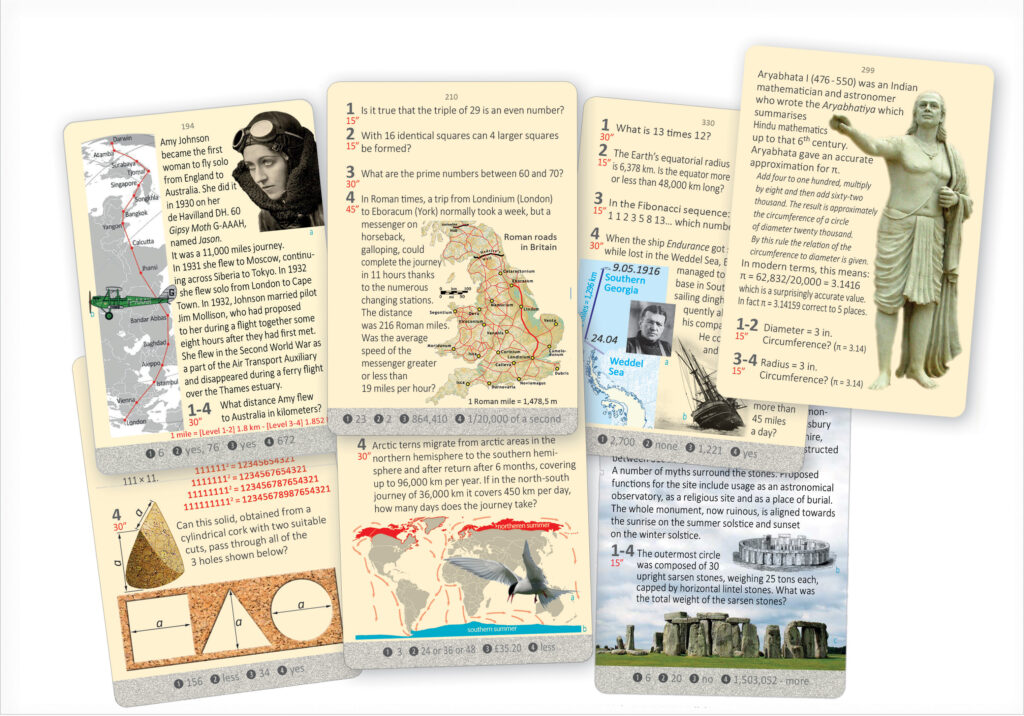Mathematicus
The game of mathematics

Mathematicus is a one-of-a-kind game that debunks the legend that mathematics is a hard, sterile subject. Mathematics is undeniably the foundation of science and all technical matters, but it is also entertaining and offers an incredible variety of experiences. This is confirmed by the recent proliferation of studies carried out on recreational mathematics, from childhood stages to advanced mathematic enthusiasts.
In addition, this game aims to propose and en- hance, in accordance with the latest trends, knowledge of ancient and “exotic” mathematics. Understanding how numbers were written and counted in former times by extinct civilizations on different continents is both interesting and highly formative.
The game shows that mathematics is something that has accompanied human civilizations since their earliest developments and is a universal language.
The game aims to offer a roundup of the most curious and exciting aspects of mathematics through the themes presented in the squares and insights available in the book; knowledge is also provided on how to perform interesting experiments. However, the game is not only an opportunity to enrich cultural awareness, but also a chance to become familiar with mathematics and more open to the world of science.
Furthermore, it is also a fun and practical activity. Competing with other players to give answers to fascinating questions, knowing how to use calculation tools from the past, composing numbers and performing operations like the Babylonians, the Egyptians or the Maya once did is a great source of satisfaction.
A game for everyone
No special knowledge of mathematics is required to play Mathematicus. In fact, the required knowledge to play at more advanced levels remains elementary maths that we all learnt in primary and secondary school.
The mathematical curiosities presented in the game squares and the booklet sometimes depict more complex concepts; however it is not necessary to understand them to play the game. For information purposes, these concepts are explained using the most basic notions.
How to play
You advance using your pawn by successfully answering questions, trying to land on squares with advantages and avoid penalty squares, thanks to a shrewd choice of dice.
As the game contains so many variables, play remains varied and unpredictable right until
the end with the winner being unknown despite certain players seemingly having an advantage
at various stages throughout the game.
Furthermore, the existence and concept of “challenges” increases player interaction
and makes for a lively exchange.
The winner is the one who, by answering questions correctly and solving problems, succeeds
in collecting the greatest number of famous mathematician figures.
The three modes of play
Mathematicus can be played in “basic” and “intermediate” modes using four different levels. This is possible as each card has questions with four progressive difficulty levels; in this way, players with diverse knowledge can play together. The players themselves decide on the game mode and level of questions and can combine different modes and levels, reflecting each player’s situation (age and background).
Example of a family to illustrate this concept: the daughter who is in her last year at secondary school plays at the highest difficulty level,
the younger son who is still attending primary school plays at the lowest level, with parents or friends each deciding the most appropriate level.
Collaborators
Simonetta Di Sieno, the former Director of the “matematita” Research Centre and members of the Milano Città Studi unit in the same centre, as well as members of the PRISTEM Centre belonging to Bocconi University in Milan have all contributed precious advice for the Mathematicus board game preparation.
The translation and the supervision of the English edition was done by the mathematician Morgan Rogers, a graduate of the University of Cambridge, during his doctoral studies in mathematics at Università dell’Insubria in Como, Italy. He has since gone on to post-doctoral research at LIPN in Paris, France.
The translation of the Instruction booklet was done by Victoria Finch.
The instruction manual
This 24-page manual presents the game pieces and sets down the rules for the three game modes.
The book
The 176-page book provides useful knowledge for playing in advanced mode. Expanded descriptions of the topics featured on the game squares can also be found in the book alongside hundreds of mathematical curiosities and ideas for experiments.
Customization of Mathematicus
The publisher proposes blank sets of cards, intended for users to write questions for integration in standard game play. These questions can be of varying degrees of difficulty or concern specific areas of mathematics.
Mathematicus in schools
Elements such as “manual” calculation tools, mental calculation and familiarization with ancient and exotic numbering systems strongly stimulate students to develop mathematical sensitivity.
The game additionally offers ample opportunities for experimentation outside of the game.
The booklet explains how to write and decode secret messages, how to prepare an interstellar message, how to prepare quipu in the style of the Incas, and how to wow friends with magical mathematical games, to name but a few possibilities.
Price
The game retails at € 54.90.









